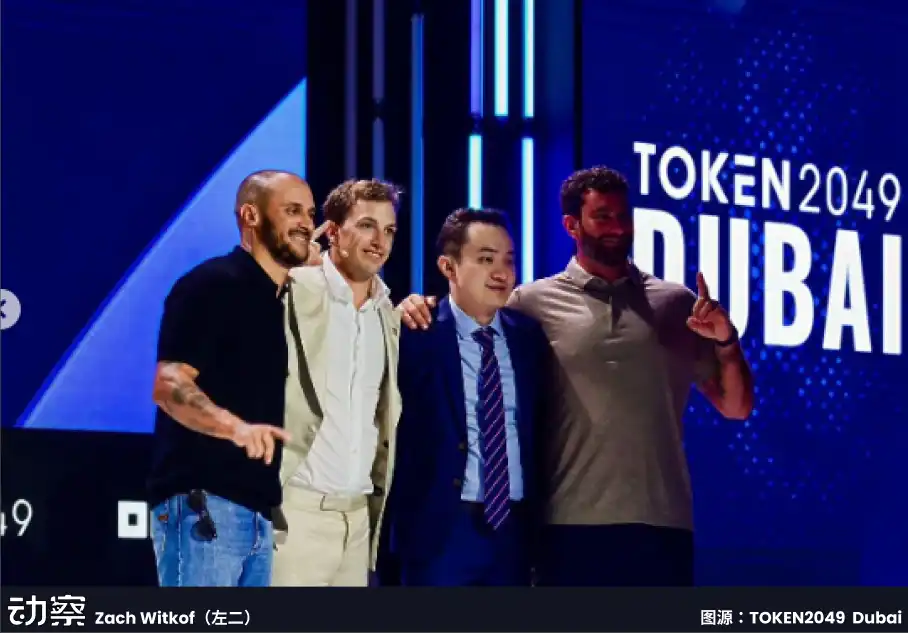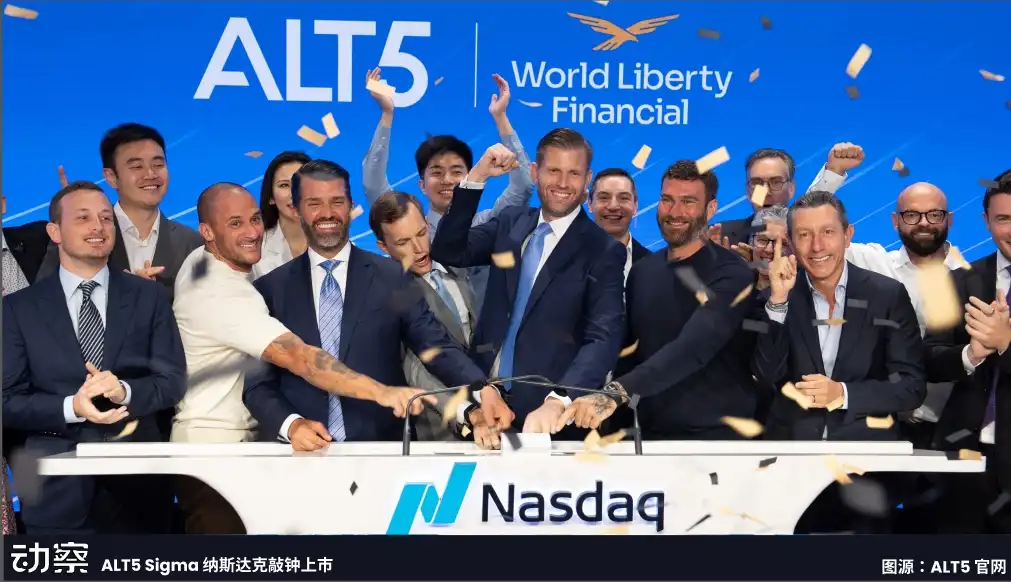Editor's Note: On September 1st, World Liberty Financial (WLFI) welcomed its first token claim and trading. However, as early as August, WLFI had already packaged its tokens into crypto-shares and listed them on the US stock market through a backdoor listing.
Currently, from a market capitalization perspective, ALT5, as a "WLFI reserve stock," has seen its US stock price plummet in pre-market trading as WLFI's price continues to decline. The Trump family's masterful grasp of the cryptocurrency narrative has yielded another wave of market gains. The following is an in-depth analysis of the ALT5 cryptocurrency company, originally published by BlockBeats on August 20th. Welcome to read.
In August, amidst the pile of Nasdaq announcements, there was a seemingly ordinary financing announcement that exploded like a hidden bomb: ALT5 Sigma issued up to 200 million common shares (approximately 10 billion RMB) at $7.50 per share, exchanging WLFI tokens for shares, and sent Trump's youngest son Eric Trump to the board of directors.
Overnight, ALT5, a fintech company with annual revenue of just $20 million, transformed itself into the "Trump family's publicly traded treasury." ALT5 wasn't just raising funds; it was also brazenly pushing the Trump family's token, WLFI, and its USD1, a politically charged stablecoin, into the U.S. securities system.
WLFI (World Liberty Financial) is not a simple startup, but a "political mint" created by the Trump family.
Founded just two months before the US election, WLFI generated hundreds of millions of dollars in revenue for the family business through the USD1 stablecoin. In other words, ALT5 isn't just leveraging a stablecoin; it's a whole suite of political and financial tools.
The question is – is ALT5 really raising funds, or is it selling a ticket to wealth with the words “political dividends” written on it?
1. ALT5’s Hidden Lineage: The Connection Between Three Evil Forces
A company's shareholder list often tells more than its financial statements.
ALT5’s shareholder structure is almost a power puzzle: offshore capital, Wall Street funds, and political tokenists are intertwined, making the company look both like a fintech company and a political-financial experiment.
What really makes ALT5 tense is the political tokenists, represented by Zach Witkoff and Eric Trump.
Eric Trump needs no introduction - he is the son of US President Trump. The family's crypto industry is currently under his jurisdiction and he has direct access to the ALT5 board of directors.
It is worth mentioning Zach Witkoff, the co-founder of the WLFI stablecoin and chairman of ALT5.
Judging solely by his resume, Zach Witkoff's background clearly indicates he's no ordinary entrepreneur. He's the son of renowned New York real estate developer Steven Witkoff, currently serving as the US Special Envoy for the Middle East. The Witkoff family has decades of experience in Manhattan real estate, owning numerous landmark buildings, and his father, Steven, has long been involved in New York's financial and political circles.
The Trump family started its business in real estate, and Steven Witkoff has long had close ties with the Trump father and son in the New York real estate circle.
Zach's relationship with the Trump family can be summed up in one sentence: real estate ties combined with political ties. Therefore, Zach and Eric's relationship isn't just a "cooperation"; it's a family-style political and financial alliance.

If Eric Trump brings his family's political resources to the table, then Zach Witkoff is the man who executes the Trump family's financial operations. He is the key bridge in this intertwined political and financial landscape.
The presence of these two individuals signifies that ALT5's development path will become increasingly politicized. It's not simply about pursuing commercial expansion, but rather stockpiling financial tools for the 2025-2028 US political cycle. In a sense, it's part of the Trump family's financial arsenal.
Let's take a look at one of ALT5's major shareholders: Clover Crest Bahamas Ltd., an offshore company registered in the Bahamas, which holds approximately 11% of the company's shares. The Bahamas is a well-known tax haven, where many wealthy individuals and businesses register their companies. The reason is simple: they enjoy relaxed tax policies while avoiding excessive regulatory scrutiny.
In simple terms, Clover Crest is like a secret channel for the Trump family, which can not only quietly transfer money to ALT5, but also isolate risks when needed.
Another source of shareholder power comes from Wall Street fund companies, such as the most familiar Vanguard Group. These funds are likely indirectly held by retail investors around the world because they operate large-scale index funds.
Vanguard's stake in ALT5 isn't significant, and it appears to be a passive investment. But the problem is: when the public sees a name like "Vanguard Group" listed among its shareholders, they intuitively perceive the company as legitimate and reliable. This is known as a "legitimate endorsement."
These three forces each have different logics: offshore financiers provide hidden funding channels to ensure that money can flow in; Wall Street funds provide facades and legitimacy to ensure that the company appears "compliant and formal"; and the political token faction provides narratives and strategic direction to push ALT5 onto the global stablecoin stage.
The combination of these three makes ALT5 both clean and dangerous.
On the surface, it is a law-abiding fintech company; in reality, it is being used as a "Trojan Horse" for stablecoins, quietly carrying the ambitions of politics and capital under the guise of compliance.
2. FinTech’s veneer: Where does the hidden door beneath compliance lead to?
On paper, ALT5 appears to be a perfectly normal fintech company. It holds a full suite of licenses and offers a comprehensive suite of services, including a payment gateway, OTC trading, custody, and a white-label exchange. With annual revenue of approximately $20 million and a gross profit margin approaching 50%, it ranks highly in the crypto payments industry. Its compliance, transparency, and impressive data make it appear even cleaner than many traditional payment companies.
But what truly catapulted ALT5 from a niche tool-based FinTech to the global spotlight was its $1.5 billion funding round in August 2025. Overnight, it was no longer just an API company, but was propelled into a new position: becoming the "Nasdaq vault" of Trump's stablecoin WLFI.
This means that ALT5 is no longer just a factory selling technology, but has become a key node in the globalization of stablecoins.
Why is it called a "backdoor"? The reason is actually very simple.
First, it's about protecting its superficial identity. If the WLFI stablecoin attempted to directly enter national payment networks, it would almost certainly run into obstacles with central banks and regulators. However, ALT5, with its existing fintech license, can take a head start as a "payment API service provider." Regulators see a compliant fintech company, not a politically charged stablecoin.
Secondly, it provides a covert channel for cross-border settlements. ALT5 Pay's API allows merchants to accept cryptocurrencies like BTC and USDT, automatically converting them to US dollars or euros in the backend. By integrating WLFI/USD1, merchants and users might not even realize they're using a stablecoin backed by the Trump family. While ostensibly a "payment technology," it effectively facilitates the penetration of stablecoins.
Finally, there's the natural integration of global networks. ALT5 already connects the Lightning Network and stablecoin payment systems, making it far more efficient than traditional cross-border payments relying on SWIFT. For many emerging markets with strong demand for US dollars but lacking direct access to Wall Street, ALT5 provides an invisible express lane. Through it, WLFI can quickly "sink" and enter the global trading landscape with minimal friction.

In this way, the significance of the $1.5 billion financing becomes clear: it is not simply expansion funds, but more like a strategic deployment to lay a global payment pipeline for WLFI.
ALT5 can naturally continue to assure regulators, "We are just a payment company that provides a compliant API." But in the shadows, its interface may be becoming a track for stablecoins to bypass the traditional financial system.
This dual narrative has made ALT5 a classic "fintech cover." Externally, it appears clean, transparent, and professional, a textbook example of FinTech. Internally, however, it is being promoted to a strategic level, becoming an indispensable piece in the globalization of stablecoins.
This may be the key to WLFI's rapid transition from a political concept to a real financial instrument: it found a "legal backdoor" like ALT5.
When the compliance cover is thick enough, stablecoins can quietly flow into the daily transactions of merchants and users, and by the time regulators really react, the door may have already been completely opened.
3. Trump’s Shadow Financial Empire
ALT5 is just the tip of the iceberg. The larger picture underneath is the Trump family building its own dollar system.







